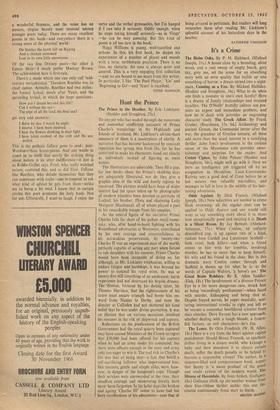Hunt the Prince
The Prince in the Heather. By Eric Linklater. (Hodder and Stoughton, 25s.) To anyone who has waded through the numerous and somewhat conflicting accounts of Prince Charles's wanderings in the Highlands and Islands of Scotland, Mr. Linklater's all-too-short summary of them is a masterpiece of clarity. A narrative that has become hackneyed by constant repetition has sprung into fresh life, for he has contrived to make his characters stand out clearly as individuals instead of figuring as mere names.
The illustrations are admirable. They fill a gap, for few books about the Prince's skulking days are adequately illustrated, nor do they give a graphic idea of the wild and lonely regions he traversed. The pictures would have been of wider interest had the space taken up by photographs gf modern islanders been devoted to portraits of Lochiel, his brother, Flora and charming Lady Margaret Macdonald, all of whom played a part in his remarkable escape from his enemies.
As the central figure of the narrative Prince Charles falls far short of his gallant royal name- sake, who, after hand-to-hand fighting with his Roundhead adversaries at Worcester, contributed by his own courage and resourcefulness to his miraculous preservation. At twenty-two Charles II was an experienced man of the world, perfectly capable of acting any part when forced to rub shoulders with his enemies. Prince Charles would have been incapable of doing so, for although, as Mr. Linklater emphasises, willing to endure fatigue and hardships, it was beyond his power to conceal his royal mien. He was at twenty-five still something of an adolescent; harsh experience had not destroyed his boyish dreams. The 'illusion, fostered by his doting, tutor, Sir Thomas Sheridan, that the righteousness of his cause must ensure triumph had borne him on- ward from Nantes to Derby, and even the disaster at Culloden had not shattered his fond belief that he was under divine protection. It was an illusion that on various occasions involved his rescuers in the risk of shipwreck and capture.
Reflections on the predicament of the British Government had the royal quarry been captured may have caused Ministers of the Crown to regret that £30,000 had been offered for his capture when he had an army under his command; but there were officers enough in the navy and army only too eager to win it. The real risk to Charles's life was that of being shot—a fate that befell a self-sacrificing follower who impersonated him. His rescuers, gentle and simple alike, were, how- ever, in danger of the hangman's rope. Though their services were unrewarded at the time, their steadfast courage and unswerving loyalty have never been forgotten. In his latter days the broken and ageing 'Charles III' seems to have had but hazy recollections of his adventures—save that of
being arrayed in petticoats. But readers will long remember them after reading Mr. Linklater's splendid account of his hazardous days in the heather.
KATHERINE TOMASSON






































 Previous page
Previous page